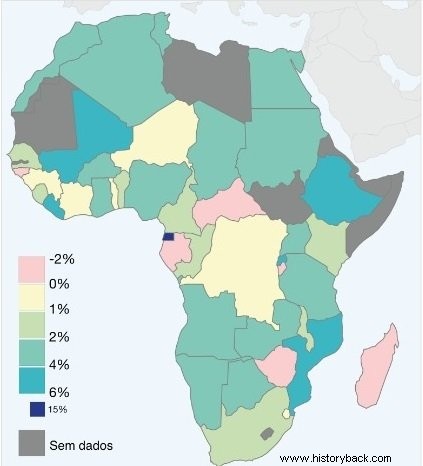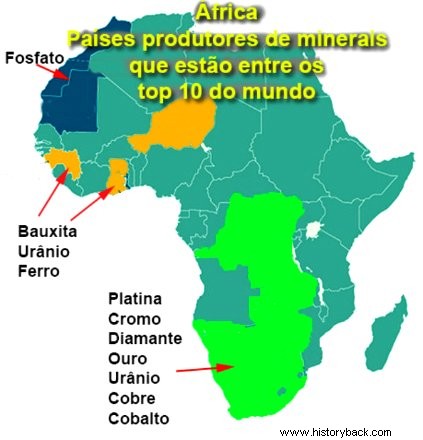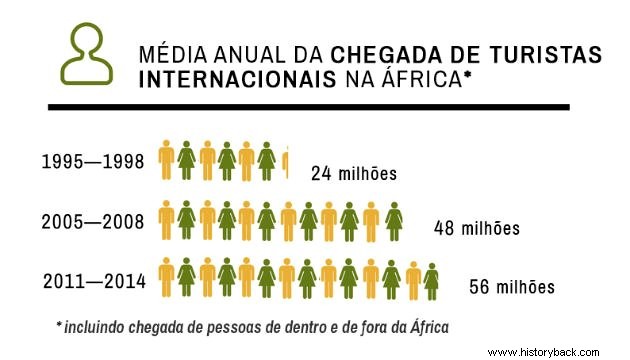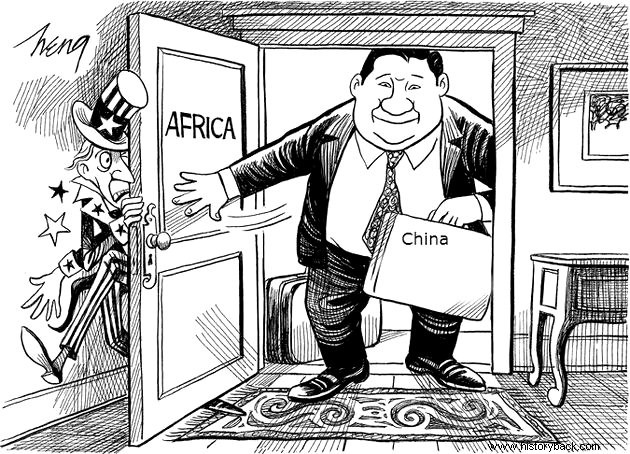Africa's economy it is guided by the exploitation of natural resources, such as oil, gas and ores such as gold and diamonds.
The continent, however, is the poorest in the world, a result of colonial and neo-colonialist exploitation.
Agriculture, tourism, the processing industry and services are still poorly practiced in most African nations. The same occurs with the transport and communication sectors, whose expansion is still limited.
In most of the 54 African countries, the economy is directly impacted by extreme poverty, food crisis, administrative mistakes, high inflation, debt and wars.
Economic Growth
The African economy experienced unprecedented growth in the first two decades of the 21st century.
With the increase in demand for oil, natural gas and food, the continent has benefited from rising prices.
Also the forgiveness of external debt in 2005, carried out for humanitarian reasons to 14 African countries, had a positive effect on the region.
 See also:Overview of Africa:map, countries and economy
See also:Overview of Africa:map, countries and economy Ores
Countries like Tanzania have registered growth rates of 6% per year since 2006, thanks to the increase in the price of gold on the international market.
In Botswana, growth is 5% per year, due to diamond reserves. The country allocates most of its resources to financing, free of charge, primary education.
Oil and Gas
The main oil producers on the continent are:Algeria, Libya, Egypt, Nigeria, Equatorial Guinea, Gabon and Congo-Brazzaville, Angola. Sudan, Mauritania, São Tomé and Príncipe and Chad emerge as new producers.
Africa has 10% of the world's oil reserves and 8% of the world's gas reserves.

Tourism
In North African countries such as Egypt, Morocco and Tunisia, tourism plays an important role in the economy. This activity is also an important source of income for Cape Verde and most coastal countries in both the Atlantic and Indian Oceans.
The nature parks of Kenya and South Africa attract tourists interested in seeing the great wild animals. Hunting, although controversial, is responsible for the income of these countries as well.
According to data prepared by the UN, tourism in Africa, from 2011 to 2014, represented around 8.5% of GDP and generated 2.1 million jobs.
It should be noted that women occupy a third of these jobs. Since 1996, tourism in Africa has grown at a rate of 9% per year.

Agriculture
Agriculture in Africa is the economic activity that occupies most of the population. Kenya has emerged as a leading country in organic agriculture.
Ethiopia is the fifth largest coffee exporter in the world and has been growing at 6% a year since 2006, thanks to demand from countries like India.
Even sub-Saharan countries invest in partnerships that allow them to solve the region's lack of water in order to be able to plant with as little liquid as possible. They produce maize, cassava, bananas and beans.
On the other hand, Brazilian companies are occupying the lands of Angola, Mozambique and Sudan promoting agriculture.
Through diplomatic agreements and Embrapa (Empresa Brasileira de Pesquisa Agropecuária), Brazil helps Angolans to plant and be self-sufficient in food production.
Despite growth, rising cereal prices and agricultural modernization, in 2012 FAO issued a warning:28 African countries would still need international food aid to avoid hunger.
See also:Hunger in AfricaForeign Investment
China was the country that most invested in the African continent in the first decades of the 21st century. The Chinese made partnerships and now work with oil, civil construction and telecommunications companies. There are more than 10,000 companies from China doing business in Africa.
However, the Chinese take part of the workforce to these enterprises and it is estimated that there are 100,000 Chinese working there.
Despite representing only 3% of the volume of trade with China, Africa is a strategic continent for the Asian giant. The objectives are not just economic, but diplomatic, as China seeks allies to:
- counterbalance American influence in the world;
- prevent Japan from getting votes from African countries to be elected a permanent member of the UN Security Council;
- exclude any international recognition of Taiwan.

Problems
Despite the optimistic data, much remains to be done on the continent, which still suffers from unstable or undemocratic political regimes.
2016 was a difficult year for African economies, with the price of raw materials falling. Nigeria has lost its rank as the continent's leading economy and has fallen into recession.
South Africa narrowly escaped the devaluation of its currency and the validity of the CFA franc, used by 12 countries on the continent, was questioned.
The continent still suffers from problems of lack of security and infrastructure that can jeopardize its growth.
It is important to remember that the thirty lowest HDI countries in the world are in Africa.
See also:Countries of Africa:map, capitals, areas, languages and currenciesDiseases
Another negative factor for the economy of African nations is the high number of epidemics. Today, HIV is a reality in Sub-Saharan Africa, raising costs and killing the economically active population.
In West Africa, the Ebola epidemic was responsible for a 70% drop in tourism incomes in Liberia and Senegal.
See also:Imperialism in Africa